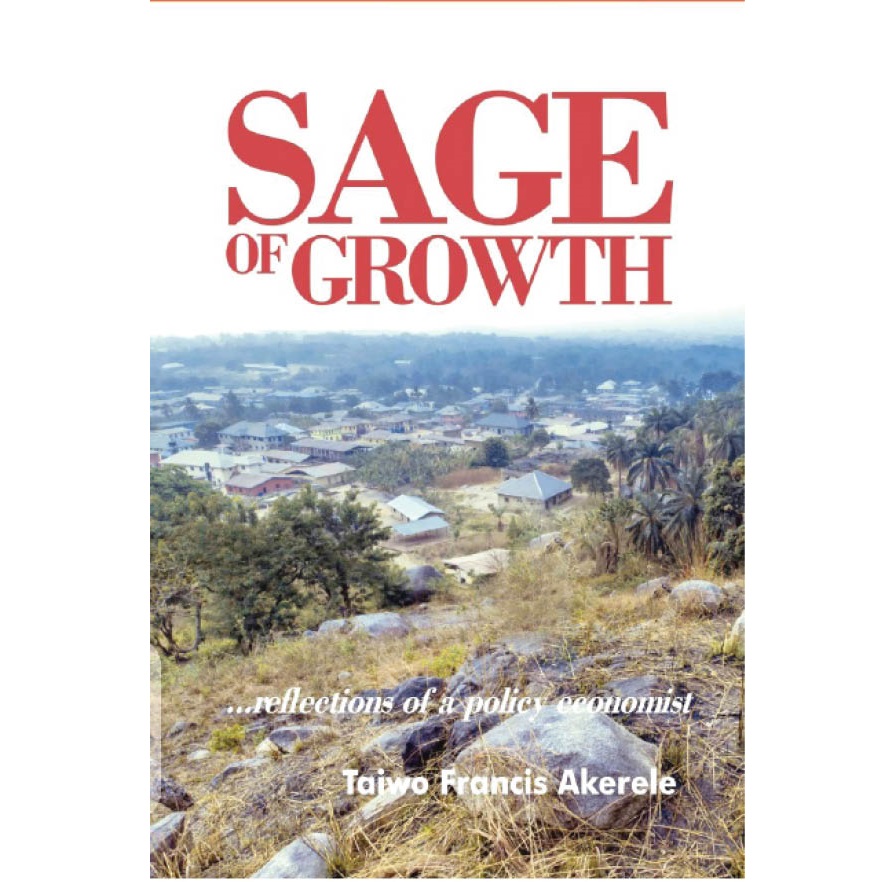- Title: Sage of Growth: Reflections of a Policy Economist
- Author: Taiwo Francis Akerele
- Pages: 208
- Publisher: Policy House Limited
- Reviewer: Lois Otse Adams
In ‘Sage of Growth: Reflections of a Policy Economist’ the author systematically presents, between lines of fact, the mutual relationship between the former labour leader and Governor of Edo State, Comrade Adams Oshiomole and the present Governor of Edo State, Godwin Obaseki. It is written to meet the yearnings and aspirations of those who desire to equip themselves with useful information about the socio-economy, civil society, politics and so on.
The author, Taiwo Francis Akerele, is a trained banker with World Bank experience, member of several literary associations, reliable shoulder of the Adams Oshiomole-led Edo State Economic Team where Godwin Obaseki served as Chairman and former Chief of Staff to Edo State Governor, His Excellency, Godwin Obaseki.
The book attempts to explain the genesis of Edo State’s engagements with international partners and how it earned the trust and confidence of the international development association through the execution of reforms that preceded partners’ entrance into the state.
Dr. Kenneth Kalu, Assistant Professor of Global Management, Ryerson University, Toronto, Canada, in his foreword, states that the book lends credence to the fact that resilience, perseverance and endurance are keys to success. He also reminds us to sustain the ancient values which are constant in ensuring a decent and equitable society by striving to determine that we illuminate our world wherever we may find ourselves, and by working assiduously to expand the common good for the benefit of all.
Akerele wrote that the introduction of Christianity and the preaching of the Bible, both in Churches and in schools gave rise to serious conflict of interest amongst the people. That the challenge of managing the identity crisis within the communities further widened the gap between cultures. That the African culture was nearly annihilated and in its wake the continent lost its value systems that held the societal fabric together. The loss of those values accounted for why we have so many churches and unbelievers today and yet few Christians and little good done to sustain humanity.
The author laces the nine chapter-book with photographs that capture major events with a cover photograph that shows a perfect blend of nature; fresh morning dew that overshadows the hills of the community, surrounded by trees, rocks and grasses.
In page 89, the author states; “The Nigerian State has struggled to retain her position as the Giant of Africa since her post-independence because successive administrations have failed to embrace global economic change. “I have lived in Nigeria where good values were significant, where people lived quality lifestyles with government support, where social security for citizens was the top priority of government, where people loved passionately, where people in authority were responsive to the citizens and made utmost priority the welfare of those they represented, where public schools were seen as pride of every parent, where quality education mattered, where public health system was delivered to door steps and focused medical personnel employed into the system.
“Considering the obvious change from the Old Testament to the New Testament leadership therefore, it calls for debate to understand the extent we as a nation have derailed from accessing affordable health delivery system to seeking medical attention abroad, from having confidence only in public health centres to priding in local private hospitals, from having boreholes in front of every home to lacking clean and affordable water supply. Instead of increasing educational standards by investing more in basic education to strengthen educational institutions and to gain the confidence of the public the state has rather become a tool for under-development because over the years it has spent so much resources in nurturing uneducated, ignorant and nonchalant people, who in turn were empowered to aspire for political offices unlike then when only educated people drove the affairs of government.”
He also states that although the World Bank Group has come under harsh criticism from a section of the Global Civil Society for partnering with all forms of government, whether democratic or undemocratic, it had insisted that there is a strong relationship between the quality of life of people all over the world and the quality of governance and development. He adds that the challenge of where the boundary needs to be drawn in the area of partnership necessitated the establishment of a very strong and sometimes difficult to meet conditions or prior actions before availed credits could be made available to borrowing entities, particularly in weak states and those that lack internationally-accepted systems of governance like democracy and constitutionalism.
The author presents documents about the International Development Association (IDA), what the IDA does, the road to 1st Edo Development policy operations, specific reform executed by Edo state government, fiscal governance, economic planning and project monitoring, additional reforms carried out, fiscal sustainability, acknowledgement of reforms’ efforts, and so on.
In Chapter six he talks about the disbursement of bank funds to borrowing entities such as Nigeria, which he describes as not as easy as a headline will make it look.
Without mincing words, this book is a must-read that could facilitate a government’s application of selflessness and humility in service. It can also help elevate the Nigerian society to a point where it regains its lost glory, economically and politically.
Adams is a writer and author of ‘Uduk, the Surrogate Daughter’

 Join Daily Trust WhatsApp Community For Quick Access To News and Happenings Around You.
Join Daily Trust WhatsApp Community For Quick Access To News and Happenings Around You.
